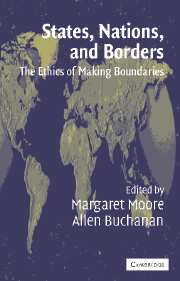Book contents
- Frontmatter
- Contents
- About the Contributors
- Acknowledgments
- 1 Introduction: The Making and Unmaking of Boundaries
- THE JEWISH TRADITION
- THE CONFUCIAN TRADITION
- 4 The Making and Unmaking of Boundaries: A Contemporary Confucian Perspective
- 5 Borders of Our Minds: Territories, Boundaries, and Power in the Confucian Tradition
- THE CHRISTIAN TRADITION
- THE NATURAL LAW TRADITION
- THE ISLAMIC TRADITION
- THE LIBERAL TRADITION
- THE INTERNATIONAL LAW TRADITION
- CONCLUSION
- Index
4 - The Making and Unmaking of Boundaries: A Contemporary Confucian Perspective
Published online by Cambridge University Press: 24 November 2009
- Frontmatter
- Contents
- About the Contributors
- Acknowledgments
- 1 Introduction: The Making and Unmaking of Boundaries
- THE JEWISH TRADITION
- THE CONFUCIAN TRADITION
- 4 The Making and Unmaking of Boundaries: A Contemporary Confucian Perspective
- 5 Borders of Our Minds: Territories, Boundaries, and Power in the Confucian Tradition
- THE CHRISTIAN TRADITION
- THE NATURAL LAW TRADITION
- THE ISLAMIC TRADITION
- THE LIBERAL TRADITION
- THE INTERNATIONAL LAW TRADITION
- CONCLUSION
- Index
Summary
Introduction
More than 2,500 years ago, a political thinker named Master Kong (Latinized name: Confucius; c. 551–479 BC) left his native state of Lu, hoping to find a ruler more receptive to his ideas about good government. Unfortunately, Confucius did not have any luck, and he was forced to settle for a life of teaching. Several generations later, a pupil of Confucius's grandson named Master Meng (Latinized name: Mencius; c. 390–305 BC) committed himself to spreading Confucius's social and political ideas. Like the old master, Mencius wandered from state to state, looking for opportunities to put his political ideals into practice. Mencius had slightly more success – he served briefly as Minister of the State of Ch'i – but he eventually became disenchanted with political life and reluctantly settled for a teaching career.
Several hundred years later, however, the social and political ideas of Confucius and Mencius – as recorded in The Analects of Confucius and The Works of Mencius – proved to be literally world transforming. They slowly spread throughout China, Japan, and Korea, and by the late nineteenth century, the East Asian region was thoroughly “Confucianized.” That is, Confucian values and practices informed the daily lives of people in China, Korea, and Japan, and whole systems of government were justified with reference to the ideals of Confucius and Mencius. Confucianism has fared less well in the twentieth century – most notably, the Chinese Communist Party did its best to extirpate every root and branch of the Confucian worldview – but more than one scholar has argued that long-entrenched Confucian habits continued to provide the background assumptions and values even during the darkest days of the Cultural Revolution.
- Type
- Chapter
- Information
- States, Nations and BordersThe Ethics of Making Boundaries, pp. 57 - 85Publisher: Cambridge University PressPrint publication year: 2003



